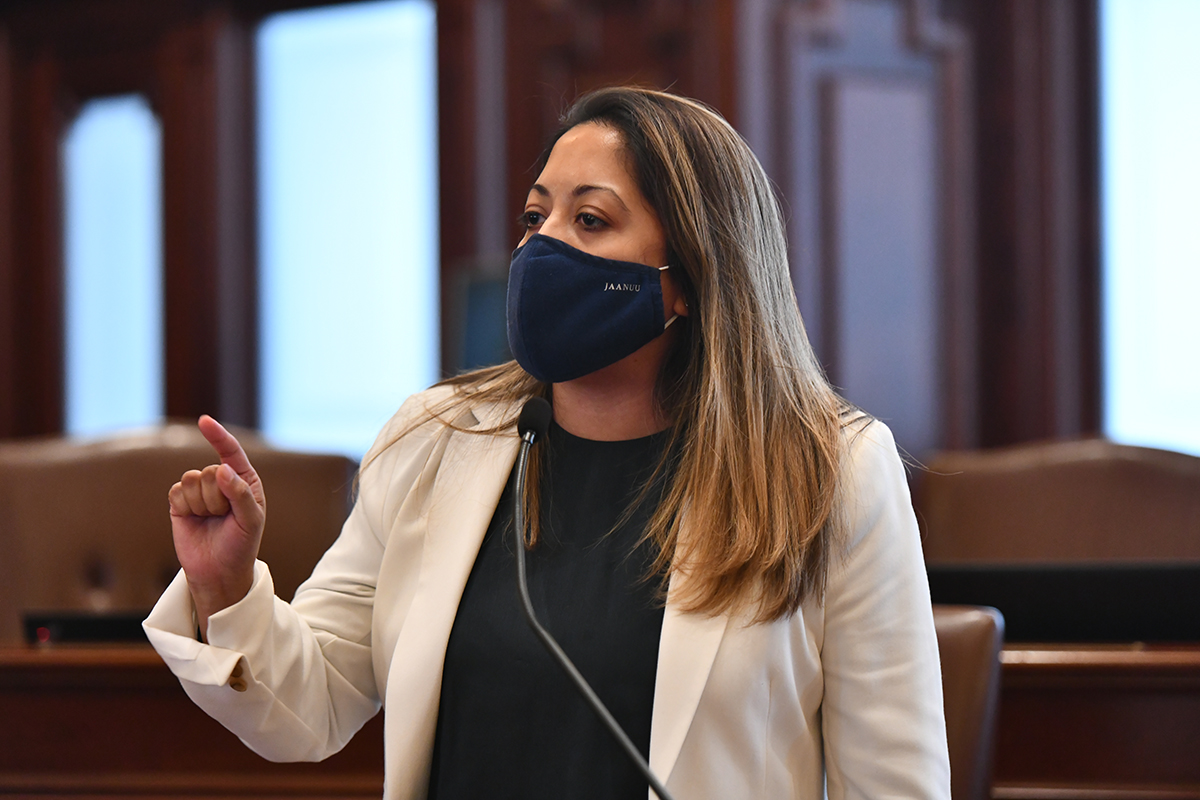- Details
- Category: Senator Celina Villanueva News

SPRINGFIELD – A measure removing sales taxes on supplies related to child nursing passed the Senate Friday thanks to the work of State Senator Celina Villanueva (D-Chicago).
“Sales taxes on basic necessities create unnecessary barriers that only add to the challenges of motherhood,” Villanueva said. “A mother’s ability to provide for her child should not be stunted by these needless financial obstacles.”
The measure, an initiative spurred by Parity for Pumps, exempts breastfeeding supplies from sales tax to include these supplies with existing feeding exemptions. Eight other states already provide these exemptions, and infant formula is exempt from sales tax in nearly every state. Adding nursing tools to the list of exemptions allows mothers to generate and collect breast milk more easily by removing some of the financial burden associated with maintaining their milk supply. In doing so, Illinois moves toward more equitable feeding options for mothers and their children.
- Details
- Category: Senator Celina Villanueva News

SPRINGFIELD – Thanks to the work of State Senator Celina Villanueva (D-Chicago), a measure to inform college students who are parents or have dependents of child care and other assistance programs passed the Senate Wednesday.
“Being a parent requires an enormous amount of time and mindfulness, and it has the potential to make other areas of life far more challenging,” Villanueva said. “The demands of receiving an education on top of being a student make balancing the two lifestyles extremely difficult, which is why we should do what we can to support our most vulnerable students.”
Senate Bill 3149 will help student parents focus on their education by ensuring they are notified of child care assistance available to them. It also gives higher learning institutions the ability to create a student-parent liaison to assist with applying for public benefits programs. The idea behind the measure was brought to Senator Villanueva by Young Invincibles, an organization working to bring equity to the political, educational, social and economic structures in the country.
Read more: Villanueva’s measure supporting students with dependents advances
- Details
- Category: Senator Celina Villanueva News

SPRINGFIELD – State Senator Celina Villanueva (D-Chicago) is aiming to exempt breast pumps and related supplies from all sales taxes with a measure that passed the Senate Revenue Committee Wednesday.
“Tax exemptions on breast pump supplies will empower mothers to prioritize their nursing without having to forsake their economic needs,” Villanueva said. “Breast feeding is a natural part of child care, and reducing the financial obstacles mothers face helps them make healthy decisions that benefit both them and their babies.”
Senate Bill 3634 will help mothers afford important breastfeeding supplies, avoid supplementing feedings with formula and maintain their milk supply by removing the sales tax on these products.
Read more: Villanueva measure will expand mothers’ access to basic necessities
- Details
- Category: Senator Celina Villanueva News

SPRINGFIELD – To help student parents focus more time on their education, State Senator Celina Villanueva (D-Chicago) advanced a measure from the Senate Higher Education Committee to inform student parents of child care and other assistance programs available to them.
“Student parents must have access to child care to graduate on time and build a better life for their children,” Villanueva said. “Making child care and other assistance programs readily available will ensure that our most vulnerable students have the resources needed to have a fulfilling educational experience.”
Senate Bill 3149 requires the Illinois Student Assistance Commission to notify student parents of the Child Care Assistance Program when disbursing information on Monetary Award Program grants. The measure also gives institutions of higher learning the ability to create a student parent liaison to assist with applying for public benefits programs.
Read more: Villanueva: Student parents must have child care to graduate
- Details
- Category: Senator Celina Villanueva News
 SPRINGFIELD –State Senator Celina Villanueva (D-Chicago) argued for stronger penalties against employers in violation of the One Day Rest in Seven Act by introducing Senate Bill 3146 in the Senate Labor Committee Wednesday.
SPRINGFIELD –State Senator Celina Villanueva (D-Chicago) argued for stronger penalties against employers in violation of the One Day Rest in Seven Act by introducing Senate Bill 3146 in the Senate Labor Committee Wednesday.
“The One Day Rest in Seven Act is one of many invaluable protections for workers in the state,” Villanueva said. “We have to make sure the expectations of employers everywhere are standard at all levels of operation.”
- Details
- Category: Senator Celina Villanueva News

SPRINGFIELD – In response to the governor’s annual budget address Wednesday, State Senator Celina Villanueva (D-Chicago) issued the following statement:
“It’s clear that certain communities have been disproportionately impacted by the pandemic, demonstrating the need for a comprehensive plan to expand access to health care and public health resources while also working toward a more equitable society. One of our top priorities has to be ensuring the safety and wellbeing of immigrant communities, who continue to struggle finding access to supportive resources.”
Read more: Villanueva: Budget proposal provides a good foundation
- Details
- Category: Senator Celina Villanueva News

CHICAGO – Local libraries in Stickney will be given nearly $39,000 in grants to provide assistance for pandemic recovery thanks to support from State Senator Celina Villanueva (D-Chicago).
“Libraries, like many of our businesses and homes, have been disrupted greatly by the ongoing COVID-19 pandemic,” Villanueva said. “Despite these challenges, our local libraries have provided resources to job seekers, educators and the general public, and our support to them should be a reflection of all they do for our communities.”
The goal of the initiative is to respond to the difficulties caused by the COVID-19 pandemic by providing funding for libraries to modify their services, transform their spaces and develop more resources for their local recovering workforce. These funds will also ensure all operations can be provided safely and effectively as the pandemic continues.
Read more: Villanueva announces recovery assistance to local libraries
- Details
- Category: Senator Celina Villanueva News

SPRINGFIELD – State Senator Celina Villanueva (D-Chicago), joined by advocacy group Parole Illinois, demonstrated strong support of Senate Bill 2333, a plan that seeks to reform the current parole system, in a press conference and rally, today.
“This is about giving people hope in what may seem to be a hopeless situation,” Villanueva said. “Our corrections system is meant to rehabilitate people. There are people who spend their time behind bars trying to better themselves, and the systems needs to recognize that.”
Senate Bill 2333 would give individuals who have been incarcerated for 20 years or more the opportunity to be reviewed for Earned Reentry. Providing a pathway to rejoin society offers an incentive to people with longer sentences to prepare for better futures.
Read more: State Senator Villanueva pushes legislation for parole reform
More Articles …
Page 9 of 16













 © 2026 Illinois Senate Democratic Caucus
© 2026 Illinois Senate Democratic Caucus